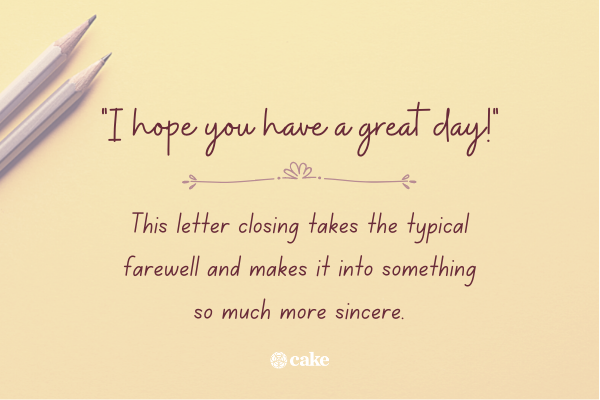
“No one I ever considered as a candidate got looked over for being too formal and polite in their correspondence however, the opposite-being too casual-always made me pause.” “It sounds like a fist pump instead of firm handshake,” she says. While the study determined “thanks in advance” was most effective when it came to receiving a response, Salemi is telling you-in advance-that it might not be best to close your cover letter with that particular phrase.
#Ways to end a letter how to
That’s why we asked Monster career expert Vicki Salemi, who has read countless cover letters in her 15 years in corporate recruiting, to tell us how to end a cover letter and what your sign-off says about you from a recruiter’s perspective. But from a job seeker’s point of view, at least, something about that phrase just doesn’t sit well with us. To our surprise, “thanks in advance” was deemed the most effective in the study. That’s why Boomerang dived further into these emails to uncover which of these popular closings had the best response rate. Using these closers in emails is one thing, but the point of a cover letter is for you to stand out-and get a response back. There were eight popular closings, all ones you’ve probably used at some point in time: Thanks, regards, cheers, best regards, thanks in advance, thank you, best and kind regards.
#Ways to end a letter software
In a study, email software company Boomerang looked at sign-offs from more than 350,000 email threads to see which are most frequently used. Luckily, there has been some recent analysis on the art of the written closing statement.

Do you get stiff and uncomfortably formal in your cover letter closing statements, or do you like to keep them super light-hearted to the point where it’s almost comedic? Maybe you just avoid the closer altogether? But there has to be a right way to finish strong, especially when it comes to knowing how to end a cover letter.

Goodbyes can be hard, both in person and in writing.

In this way, how do you end a legal letter? What if you don't know the name of the person to whom you are writing?
:max_bytes(150000):strip_icc()/business-letter-layout-example-2059703_v1-5bc4be9bc9e77c0051f08640.png)
The rule is that if you addressed it 'Dear Sir', then you sign off 'Yours faithfully', and if you addressed the person by name, then you sign off 'Yours sincerely'.


 0 kommentar(er)
0 kommentar(er)
